FIDE Director for Chess Development visits Dominica to foster chess growth

GM Nigel Short welcomed on arrival by Carlton Morvan, President of the Dominica Chess Federation From 20 to 23 September 2025, Grandmaster Nigel Short, FIDE Director for Chess Development, visited the Caribbean island of Dominica (not to be confused with the Dominican Republic). The visit carried special significance: his first trip in 2021 had inspired local players to establish the Dominica Chess Federation, which was formally registered and admitted as a FIDE member later that same year. Since then, chess life in the country has developed rapidly. Today, the Federation unites 67 registered members and around 100 active players, while approximately 1,500 island residents have been introduced to the game. Dominica fielded teams at the 2022 Chess Olympiad in the open section and at the 2024 Olympiad in both the open and women’s categories. National players have also participated in the prestigious CARICOM International Chess Tournament in 2024 and 2025, as well as in internationally rated hybrid competitions. The Federation regularly stages national championships and open and women’s tournaments. In 2025, in collaboration with the Confederation of Chess for America, it organised the island’s first chess festival, an event that attracted broad media coverage and became a milestone for the wider community. Particular attention is being given to work with youth and schools. After receiving 400 chess sets from the Confederation of Chess for America in collaboration with the Gift of Chess programme, the Federation began distributing them to educational institutions. Already, eight Dominican schools have their own chess clubs, where students engage in training sessions, masterclasses, and tournaments. Chess life is also sustained online: interisland competitions are held every Sunday on lichess.org, while on Thursdays, players gather for regular meetings on the University of the West Indies campus. Women and girls in Dominica receive additional support through the Queen’s Gambit Challenge—a global initiative of the FIDE Commission for Women’s Chess. This programme provides free training and mentorship designed to strengthen skills and confidence, creating opportunities to represent the country on the international stage. Simultaneous exhibition at the Fort Young Hotel: Nigel Short playing against 20 participants During his September 2025 visit, Nigel Short met again with the Federation’s leadership and the country’s leading players. His schedule included a simultaneous exhibition at the Fort Young Hotel, where seventeen young talents and three invited participants took their places at the boards. The event drew a large audience, who watched with keen interest and were inspired by the Grandmaster’s skill. The visit also included stops at St. Mary’s Academy and Convent High School. At St. Mary’s Academy—the Federation’s most successful Chess in Schools institution and winner of the 2024 School Chess Tournament—GM Short met with Principal Mrs. Sylvia Jno. Baptiste, who highlighted the school’s progress and commitment to chess education. The Grandmaster spoke to students about the global benefits of chess, engaged with them directly, and presented commemorative chess pins to over twenty students in a special ceremony. Nigel Short with Principal Mrs Sylvia Jno. Baptiste and members of the chess club at St. Mary’s Academy At Convent High School, GM Short was welcomed by Principal Ms. Isabella Prentice and club teacher Mr. Nicholas Goldberg. In a lively discussion with more than twenty students, including national women’s champion Ayani Casimir, he shared advice on improving their play, encouraged them to work hard, and answered questions about his career and experiences at the highest level of the game. Nigel Short with students of the Convent High School chess club Beyond the schools, the programme featured meetings with representatives of the tourism sector and potential partners, as well as a press conference and interviews focused on the development of chess in Dominica and across the Caribbean. The Dominica Chess Federation regards this visit as a fresh impetus for the growth and consolidation of the national movement. Support from FIDE, the attention of international experts, and the enthusiasm of the local community are creating a strong foundation for the further advancement of chess on the island and for Dominica’s deeper integration into the global chess family.
Queen’s Gambit Challenge: Empowering over 580 women from 80+ countries
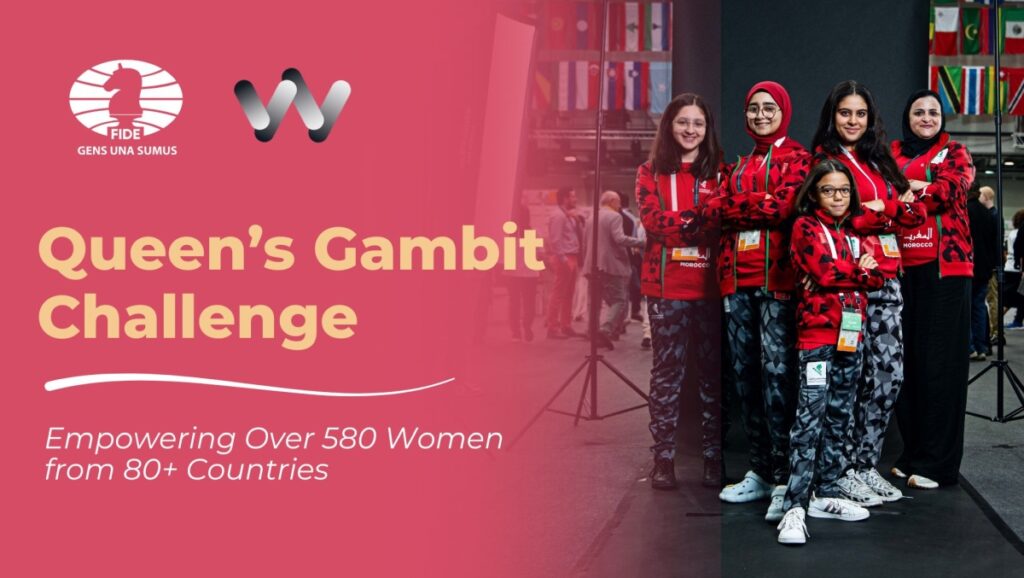
The FIDE Commission for Women’s Chess proudly hosted the opening ceremony of the Queen’s Gambit Challenge – Intermediate Stage, a groundbreaking initiative designed to empower women in chess and prepare them for future representation on the international stage. The ceremony brought together women of all ages, cultures, and backgrounds, with players represented from over 80 countries worldwide, showcasing the global reach and inclusivity of the program The Intermediate Stage of the Queen’s Gambit Challenge offers free chess training primarily for female players from Levels 3, 4, and 5 federation countries who are ready to build on their foundation and sharpen their skills for higher levels of competition. This stage provides structured online training with experienced coaches, focusing on practical middlegame and endgame techniques, advanced strategies, and tournament preparation. Beyond improving chess strength, the program also serves as a pathway for participants to prepare for representing their countries at the Chess Olympiad, while fostering international connections among women in chess through a supportive and diverse learning environment. Over 580 women have registered to take part in the program. The event was opened by Tris-Ann Richards (Lead Coordinator), who highlighted the extraordinary progress achieved in the first stage of the program and reaffirmed its mission to create opportunities for women. “Every move you make in this program is not just a step for yourself but a step forward for women’s chess globally.” The Chair of the FIDE Commission for Women’s Chess, Anastasia Sorokina, delivered a heartfelt remark emphasizing the importance of sustained investment in women’s chess development. She underscored how initiatives like the Queen’s Gambit Challenge help build confidence and create pathways for future Olympiad teams. Present also was Francisco Cruz, Vice President of FIDE America and Chair of the Diversity Commission, who praised the program for bridging cultural and geographic divides. He encouraged participants to see chess as not only a competitive pursuit but also a tool for personal growth, resilience, and unity. Introducing the coaches The coaches assigned to guide participants throughout the stage are: Leonid Sandler Jomo Pitterson Khadidja Latreche Steel Shirley Castillo Sanchez Denise Bouah Deborah Richards Porter Russel Porter Sadiqah Razak Ryan Blackwood Milena Shahazizyan Program structure and next steps The Intermediate Stage will run from September 20 to November 2, 2025, with a clear structure designed to balance flexibility with rigor. Sessions are held in English, French, and Spanish and specifically tailored to each age group and time zone. Looking ahead The Opening Ceremony successfully set the tone for a program that is about far more than chess. It represents a global sisterhood of players, united by a common goal: to elevate their skills, strengthen their federations, and pave the way for greater women’s representation at the highest levels of the game. The program will culminate in a closing ceremony on November 2, 2025. The next phase of the Queen’s Gambit Challenge will support National Female Teams preparing for their first Olympiad and commence in March 2026.
2nd FIDE Chess Olympiad for People with Disabilities: List of teams announced
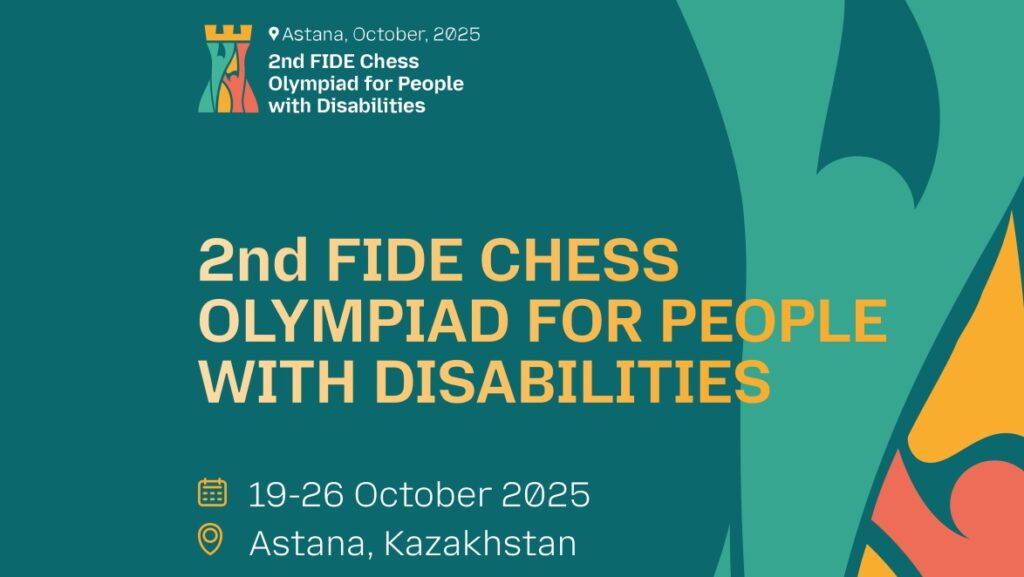
FIDE is pleased to announce the official list of participating teams for the 2nd Chess Olympiad for People with Disabilities, to be held from October 19–26, 2025, in Astana, Kazakhstan. Following the success of the inaugural edition in Belgrade in 2023, the event once again brings together players from all over the world to celebrate inclusivity, fair play, and the unifying power of chess. A total of 35 teams will compete in Astana, with participation from all four continents, the three international associations of players with disabilities, and additional nominations from the FIDE President and the host federation. Participating teams Europe – 9 teams Poland, Hungary, Israel, Ukraine, Germany, Croatia, Czech Republic, North Macedonia, Serbia Asia – 7 teams FIDE, Philippines, India, Bangladesh, Myanmar, Uzbekistan, United Arab Emirates Americas – 7 teams Cuba, Venezuela, Argentina, Colombia, USA, Chile, Panama Africa – 5 teams Egypt, Zambia, Zimbabwe, Uganda, Kenya International Associations of Players with Disabilities – 3 teams International Braille Chess Association (IBCA), International Chess Committee of the Deaf (ICCD), International Physically Disabled Chess Association (IPCA) Nominations of the FIDE President – 2 teams Kazakhstan ICCD, FIDE 2 Host Federation – 2 teams Kazakhstan 1, Kazakhstan 2 With 2025 declared the Social Chess Year, this Olympiad highlights FIDE’s continuing commitment to making chess accessible to everyone, regardless of physical abilities. With strong representation across continents and organizations, Astana is set to welcome a truly global competition that embodies the spirit of inclusion and the universal language of chess.
FIDE World Junior Rapid & Blitz Championships 2025 kick-off in Lima, Peru
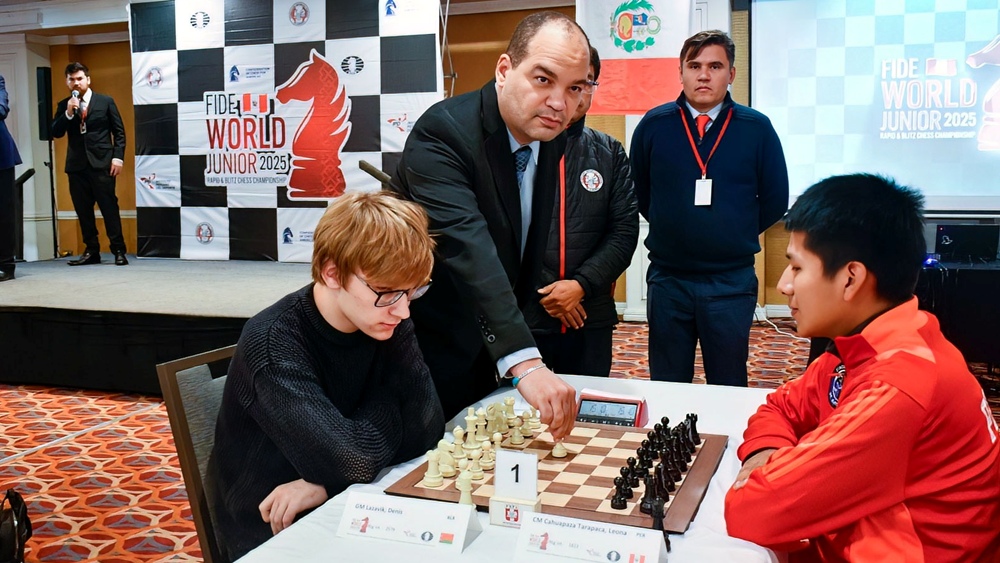
The city of Lima, Peru, has become the world stage for the future of chess as it hosts the FIDE World Junior Rapid & Blitz Chess Championships 2025. From September 22 to 28, the brightest talents under the age of 20 are competing at the Sheraton Lima Centro Histórico Hotel in two prestigious tournaments showcasing both speed and strategy. The championship is organized under the auspices of the International Chess Federation (FIDE), in collaboration with the Peruvian Chess Federation and the Continental Chess Confederation of the Americas (FIDE America). This event not only celebrates the rising stars of international chess but also strengthens Lima’s position as a host of world-class sporting competitions. The opening ceremony was graced by José Carrillo Pujol, President of FIDE America, and Víctor Mendoza, Director and organizer of the event, who performed the ceremonial opening moves. Players from 20 countries are participating: Germany, the Netherlands, Spain, Bolivia, Kazakhstan, Uzbekistan, Belarus, Cuba, Bulgaria, Colombia, Costa Rica, Ecuador, El Salvador, Romania, India, Uruguay, Mexico, Aruba, and Peru. The event brings together cultures, talent, and a shared passion for sport on the international stage. Chess enthusiasts can follow the competition through the official channels: FIDE World Junior Rapid Chess Championship 2025 (U20) – 15 min/game + 10 secs/move Open: s2.chess-results.com/tnr1238576.aspx?lan=2&art=0&turdet=YES&flag=30&SNode=S0 Girls:s3.chess-results.com/tnr1238565.aspx?lan=2&art=0&turdet=YES&flag=30&SNode=S0 FIDE World Junior Blitz Chess Championship 2025 (U20) – 3 min/game + 2 secs/move Open:s2.chess-results.com/tnr1238567.aspx?lan=2&art=0&turdet=YES&flag=30&SNode=S0 Girls: s1.chess-results.com/tnr1238556.aspx?lan=2&art=0&turdet=YES&flag=30&SNode=S0 Official website: fidewj2025.com/ Photos: FaceBook FDPA Report and photos: Patricia Claros Aguilar
Media accreditation opens for FIDE World Cup and FIDE Rapid and Blitz Championships

FIDE is pleased to announce the opening of media accreditation to its two major upcoming events: the FIDE World Cup 2025 (India, Goa) and the FIDE Rapid and Blitz Championships (Doha, Qatar). FIDE World Cup 2025 Dates: October 30 to November 27, 2025 Location: Goa, India This knockout spectacle will feature 206 players fighting for a share of USD 2,000,000 and three coveted places in the 2026 Candidates Tournament. Every round is win-or-go-home, making the World Cup one of the most dramatic tournaments on the calendar. Media registration form: worldcup2025.fide.com/media-registration/ FIDE Rapid and Blitz Championships Dates: December 25 to 31, 2025 Location: Doha, Qatar The FIDE World Rapid & Blitz Championships 2025 bring together the world’s elite chess talent for a thrilling end-of-year showdown. The tournaments are among the most exciting and popular events in the chess calendar, attracting top players and fans worldwide. The faster time controls and dynamic gameplay lead to thrilling and unpredictable matches, captivating audiences and keeping them on the edge of their seats. Media registration form: worldrapidandblitz2025.fide.com/media-registration/ Official website: worldrapidandblitz2025.fide.com/ We invite all media representatives wishing to cover the FIDE World Cup 2025 and the FIDE Rapid and Blitz Championships 2025 to submit their accreditation applications individually for each tournament via the media registration forms above. Accreditation is open for all members of the written press, photographic press, online media, and writers and photographers working for publications and/or websites of the FIDE National Member Federations. Accredited event media will collect their badges onsite at the events. A valid travel document containing a photo must be presented to receive media accreditation. The event organisers will ensure a comfortable working environment for all Accredited Media, providing a range of facilities and services at the level established at major FIDE events. We look forward to your coverage of the FIDE World Cup 2025 and the FIDE Rapid and Blitz Championships 2025!
From Norway to North Africa: Johan-Sebastian wins inaugural Sahel Chess Festival in Tunisia
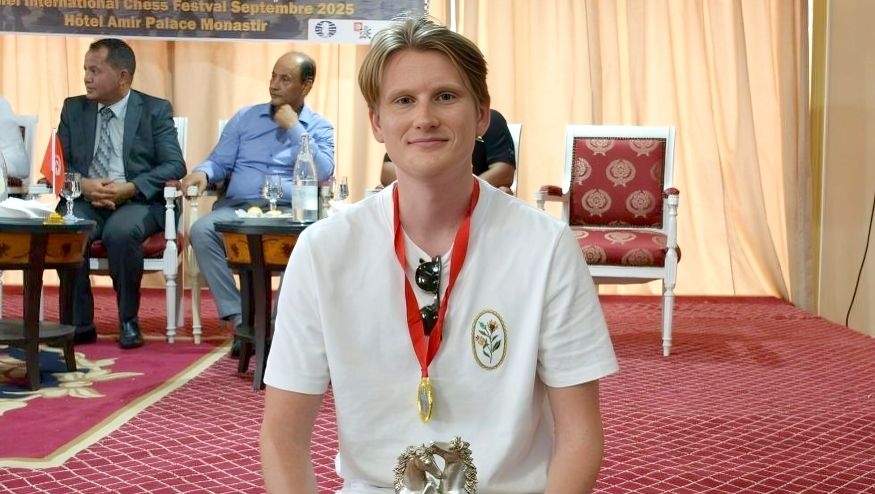
Norwegian GM Johan-Sebastian Christiansen emerged victorious at the inaugural Sahel Chess Festival, held in Monastir, Tunisia, from September 1–9, 2025. The event attracted 263 players from 11 federations. The tournament was hosted at the 4-star Amir Palace Hotel, a seaside resort that provided ideal professional chess conditions alongside a relaxing holiday atmosphere for players and their families. Christiansen, Norway’s second-highest-rated player, delivered a dominant performance, winning both the Open A and Blitz tournaments with a commanding 8.5/9 score. His only draw in the main event was against Algeria’s reigning champion, Boulmes Ala Eddine, who ultimately secured fourth place and achieved a Candidate Master (CM) norm. The festival featured four sections: Open A for players rated 2000+, Open B (1700-2000), Open C (under 1700), and a unique Open D for seniors aged 50 and above—a rare inclusion in open tournaments. Standout Local PerformancesThe event highlighted the potential of local talent, with several Tunisian players delivering impressive results: Bilel Ben Hamida, 13, won the C Open with 8.5/9, gaining 184 rating points. Sadok Zenaidi (pictured below), the 20th seed in Open A, scored 5/9, climbed to 7th place, earned 38 Elo points, and broke the 2000-rating barrier. These impressive results underscore how African players can significantly benefit from international competitions held on their home turf. It is widely recognized that players from the region are often underrated. They are eager for international events to test their skills, improve their ratings, and, for many, gain an official FIDE rating. In this context, festivals like the Sahel are of great importance. A remarkable number of young players, including many girls, entered the tournament unrated and earned their first FIDE rating—an opportunity unavailable if they only compete domestically. WFM Amen Miladi (pictured above), a member of the national women’s team, was the top female performer in the B Open. While most participants were Tunisians traveling from across the country, the festival also drew strong regional interest. Twenty players arrived from Libya, and the Algerian Chess Federation organized a bus bringing over 70 players and arbiters (pictured below), led by Federation Secretary Mrs. Karima Belkhedra. Tunisia’s leading players, including GM Amir Zaibi (the country’s only Grandmaster), IM Achraf Hbacha, FM Hamed Ben Ghanem, and CMs Ahmed Bouzidi, Yacine Barbaria, and Sahbi Taieb, were also among the participants. The international field was bolstered by IM Aleksandr Domalchuk-Jonasson, who traveled from Iceland to place second in both the Open and Blitz tournaments. The festival also included a FIDE Arbiters Seminar from September 3–5, allowing participants to earn norms and titles in accordance with official regulations. The seminar was led by lecturer IA Adnan Nesla (ALG), assisted by IA Mohamed Ali Baktach (TUN). The organizational core of the festival consisted of two dynamic local establishments: Chess Mall, a high-quality chess equipment boutique, and the Smart Chess Academy, a rapidly growing training center in Sousse. This partnership will continue, as they are already scheduled to organize the 2nd Sahel Chess Festival from September 3–10, 2026, with Sousse expected to be the next host city. Johan-Sebastian Christiansen Hassen Abdelali As the official sponsor, Chess Mall—with additional support from local and international backers—provided crucial support. The festival has the potential to grow into a significant event that promotes chess while showcasing the beauty and culture of the Sahel region. The 1st Sahel Chess Festival marked a significant step for international chess in North Africa. Its successful debut positions it as a major new event on the African chess calendar, offering vital opportunities to underrated regional players and drawing well-deserved attention to Tunisia’s vibrant chess scene. Sahel Chess Festival full results
A new generation of chess players gets an invite for the FIDE World Cup
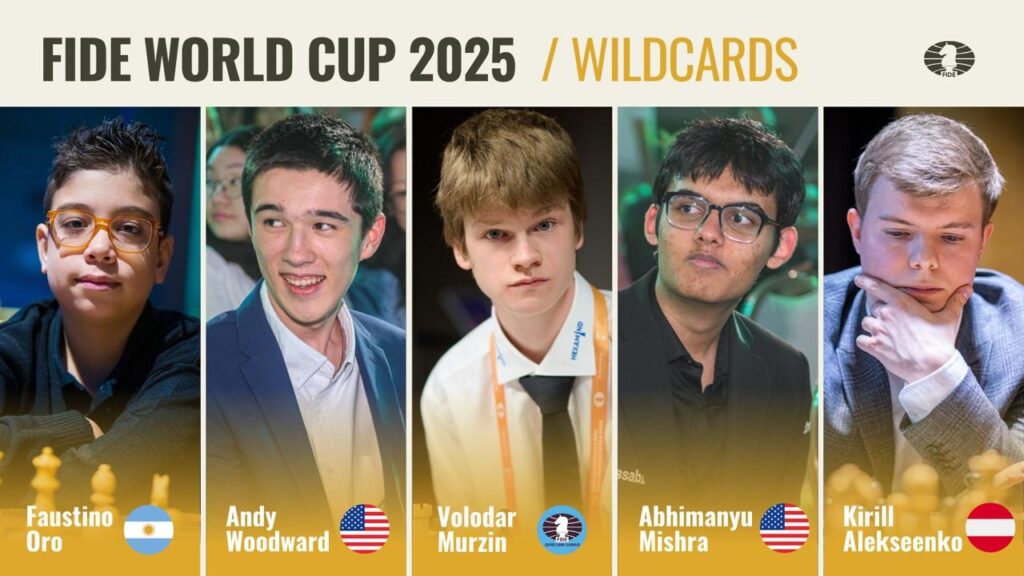
Rising stars and top performers Faustino Oro, Andy Woodward, Abhimanyu Mishra and Volodar Murzin will join well-known GM Kirill Alekseenko at the FIDE World Cup this November in India. FIDE President Arkady Dvorkovich has officially granted the invitations for this year’s FIDE World Cup, which will take place in Goa from 30th October to 27th November. The World Cup will be a unique chance for these top talents to compete in one of the most prestigious tournaments on the chess calendar. Among the players are Americans Abhimanyu Mishra (the youngest player in history to become a Grandmaster) and Andy Woodward (this year’s winner of the Junior’s Closed US Championship) who had a spectacular run at the recent FIDE Grand Swiss in Samarkand, finishing 5th and 7th respectively. World Rapid Champion, 19-year-old Volodar Murzin, who is on the path of reaching 2700 ELO (currently at 2670), also got an invite, alongside 28-year-old Kirill Alekseenko (representing Austria), a participant of the 2020/21 Candidates tournament and a well-known player at strong individual and team events. The youngest joiner is 11-year-old Faustino Oro, the Argentinian prodigy often called the “Messi of Chess” and considered one of the most promising young talents in the game. “FIDE always works hard to find ways to give talented players a chance to improve and make their mark. The decision to award invites to these five players is based on a mix of recent performance, high-level potential and their contribution to the sport,” FIDE President Arkady Dvorkovich said. “The World Cup is one of the most difficult and most exciting chess events, given its knockout format, and will be a great opportunity for these players to show their best facing the best,” Dvorkovich added. There is one more invitation place to be decided before the World Cup starts in November. The FIDE World Cup takes place every two years, lasts for three weeks, and is one of the hardest chess tournaments to win. It features 206 top world players competing in a knock-out format consisting of mini-matches. At stakes are not just the title or the prizes but, crucially, three top spots leading to the Candidates tournament where the challenger for the title of World Champion will be determined.
World Cadet Chess Championship 2025 commences in Almaty, Kazakhstan
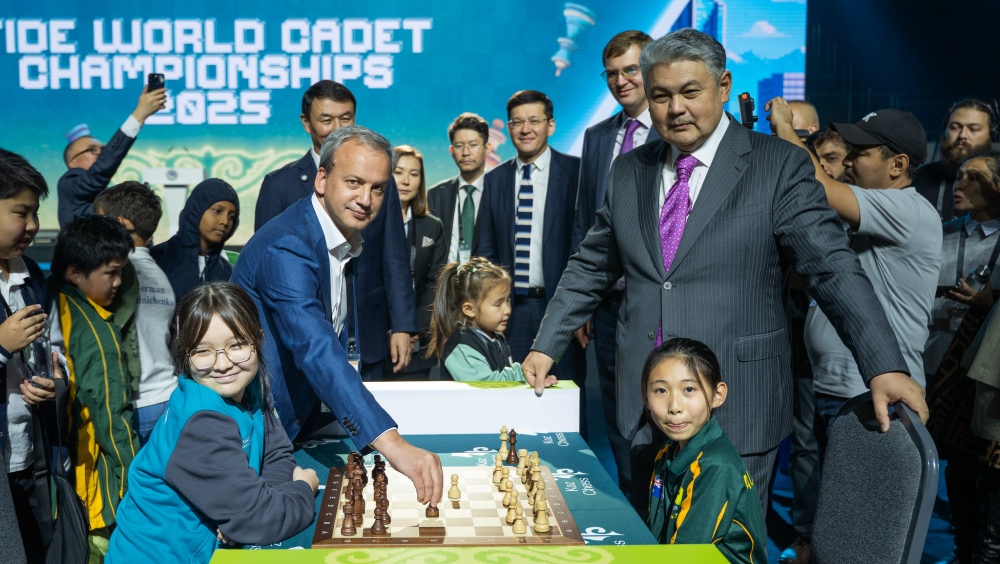
The World Cadet Chess Championship 2025 has officially started in Almaty, Kazakhstan. From September 19–30, more than 850 young chess players from 88 countries will compete for the titles across the U8, U10, and U12 categories. Kazakhstan, as the proud host, is represented by over 200 players. Such impressive representation is further evidence of the strong governmental support for chess. A few days prior to the championship, President of Kazakhstan Kassym-Jomart Tokayev visited the national Chess House. The building, located on the picturesque shore of Lake Kopa, was previously a presidential residence. It was repurposed for the benefit of children and opened its doors as the Chess House last December. During the conversation with young athletes and members of the national team, Kassym-Jomart Tokayev stressed that the state pays special attention to the development of chess, as well as to the promotion of children and youth. The glittering opening ceremony of the World Cadet Championship featured several distinguished guests: • Yerzhan Kosherbayev, Deputy Prime Minister of Kazakhstan• Darkhan Satybaldy, Akim of Almaty• Arkady Dvorkovich, FIDE President• Timur Turlov, President of KazChess Greeting the participants and guests of the championship, the president of KazChess/KFSH (Kazakhstan Chess Federation), Timur Turlov, emphasized: “No chess tournament, and perhaps no sporting event in our country’s history, has ever gathered such an extensive lineup of participants. This is a truly historic moment for Kazakh chess and our country. But we are welcoming guests not only as hosts but also in our status as one of the world’s strongest chess nations and the tournament’s main favorite.” Following musical and dance performances by popular Kazakh artists, the State Anthem of the Republic of Kazakhstan and the FIDE anthem were rendered. After Yerzhan Kosherbayev, Darkhan Satybaldy, Arkady Dvorkovich, and Timur Turlov made the first ceremonial moves on the top boards in the U12 Open and U12 Girls sections, the event was declared officially open. The rounds are played daily, except for September 25, which is a rest day. On this day, the young players will have the opportunity to take an excursion to the Shymbulak mountain resort, participate in the World Problem-Solving Championship, and compete in a blitz tournament with a prize fund of $2,000 USD. Photos: KazChess
Praggnanandhaa leads FIDE Circuit 2025; Eighth spot in Women’s Candidates wide open
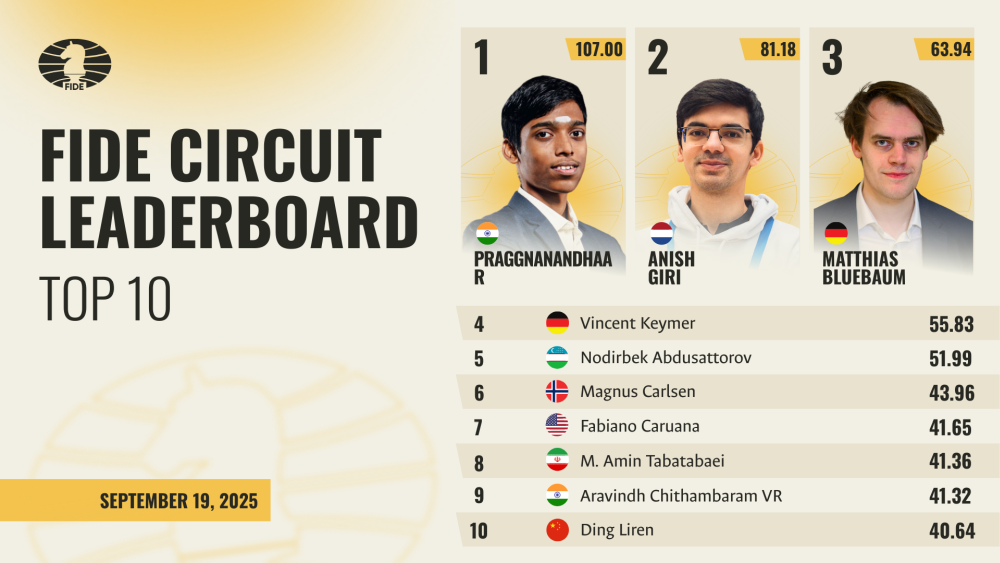
The recently concluded 2025 FIDE Grand Swiss and Women’s Grand Swiss in Samarkand have significantly reshaped the standings for both the FIDE Circuit 2025 and the Women’s Events 2024-2025. Despite earning no circuit points in Samarkand, Praggnanandhaa Rameshbabu preserved his dominant position in the FIDE Circuit 2025 standings. Crucially, his two main competitors—Anish Giri (winner of the 2025 Grand Swiss and currently second in the race) and runner-up Matthias Bluebaum—qualified for the 2026 Candidates Tournament through this event and are therefore no longer in the circuit race. As a result, the young Indian’s closest rival is now Vincent Keymer. The German GM gained 16.79 points in Samarkand and climbed to fourth position, but he still trails the leader by 51 points. Notably, Keymer has played just three tournaments counting toward the FIDE Circuit 2025, but there are few point-heavy events remaining in the next three months. The same applies to Nodirbek Abdusattorov (currently fifth, with four tournaments), as well as Magnus Carlsen and Chithambaram Aravindh, who have played only two events each. In summary, Praggnanandhaa’s lead looks virtually insurmountable. Even a brilliant performance in the remaining events by one of his competitors is unlikely to prevent him from qualifying for the 2026 Candidates via the FIDE Circuit 2025. The situation in the Women’s Events 2024-2025, however, is far more intriguing. Following the triumphs of Vaishali R and Kateryna Lagno in the Women’s Grand Swiss, all seven leading players in the Women’s Events race have qualified for the Women’s Candidates via various paths. The eighth and final spot in the competition—which will determine the challenger for the women’s world title—is still up for grabs. Currently leading the battle for that last berth is Bibisara Assaubayeva (99.4), who earned 60 points for her third-place finish in Samarkand and now sits eighth, just behind the already-qualified players. Chasing her are Song Yuxin (who tied for third place in Samarkand), Anna Muzychuk (both on 80 points), the winner of the 2022–23 Women’s Candidates Lei Tingjie (62 points), and the experienced Harika Dronavalli (58.5). Young Afruza Khamdamova, former Women’s World Champion Alexandra Kosteniuk (both on 38.5), Mariya Muzychuk (26.40), Nana Dzagnidze (25), Ulviyya Fataliyeva (20), and Irina Krush (20) also have a shot. With the large number of points available at the upcoming Women’s Rapid and Blitz Championships, all remain mathematically in the race. Each of these contenders faces the formidable challenge of outperforming the rest in the season’s final events to secure the last coveted spot in the Women’s Candidates 2026. We maintain dedicated pages on our website for the FIDE Circuit 2025 and FIDE Women’s Events 2024-2025, featuring the latest information on eligible tournaments, current standings, and regulations. Visit: FIDE Circuit 2025 and FIDE Women’s Events 2024-2025
Record number of teams to participate in 5th Intercontinental Championship for Prisoners

The 5th FIDE Intercontinental Online Chess Championship for Prisoners will be held October 14–16, 2025, bringing together incarcerated players from around the world in a unique celebration of the rehabilitative power of chess. Organized as part of the Chess for Freedom program, a joint initiative by FIDE and the Cook County Sheriff’s Office (Chicago, USA), this annual event highlights the role of chess in education, inclusion, and reintegration. This year’s championship sets a new record with 135 teams representing 57 countries, including 89 men’s teams, 26 women’s teams, and 20 youth teams. Six countries — Eswatini, Guyana, St. Kitts and Nevis, Lesotho, Poland, and Aruba — are making their debut, further expanding the global scope of the initiative. Examples from new participants show the impact of chess behind bars. In Guyana, the Prison Service launched a training and development program at Lusignan Prison with the support of FM Anthony Drayton and the Guyana Chess Federation. Donated chess sets are helping extend the program across the country’s correctional facilities, giving participants valuable skills in problem-solving and critical thinking. In Aruba, the national federation’s Chess for Freedom program recently inspired incarcerated individuals through competition, focus, and creativity, demonstrating that chess can serve as a tool for empowerment and unity. The championship will be played on Chess.com with a time control of 10 minutes + 5 seconds increment. The round-robin stage and the finals will be broadcast live on the FIDE YouTube channel, featuring guest appearances from chess officials, prison authorities, coaches, and correctional officers sharing their experiences of teaching chess in prisons. Now in its fifth edition, the Intercontinental Online Chess Championship for Prisoners has become one of the flagships of FIDE Social Year activities. Alongside annual conferences and expanding national programs, growing research continues to confirm the positive outcomes of teaching chess in correctional settings — from improving concentration and discipline to strengthening social inclusion and rehabilitation prospects. With record participation, inspiring stories, and a truly global reach, the 2025 Championship promises to once again showcase the unifying power of chess — proving that the 64 squares can change lives, no matter the circumstances.

